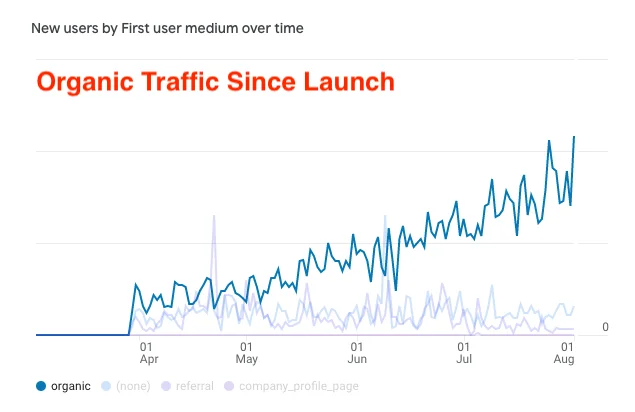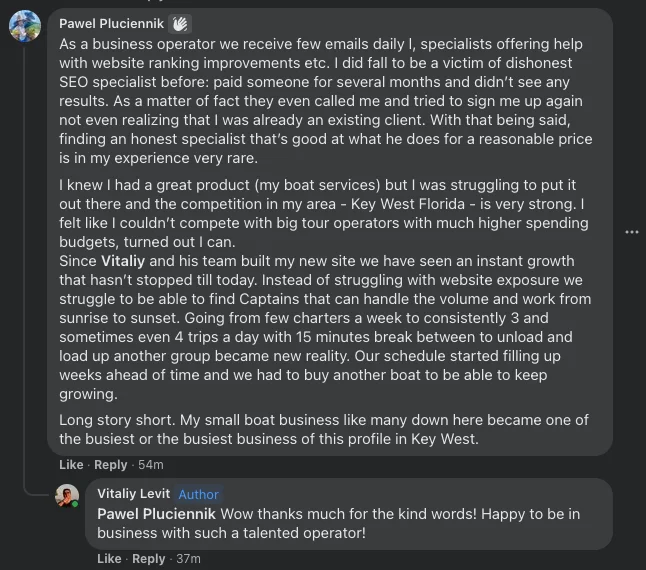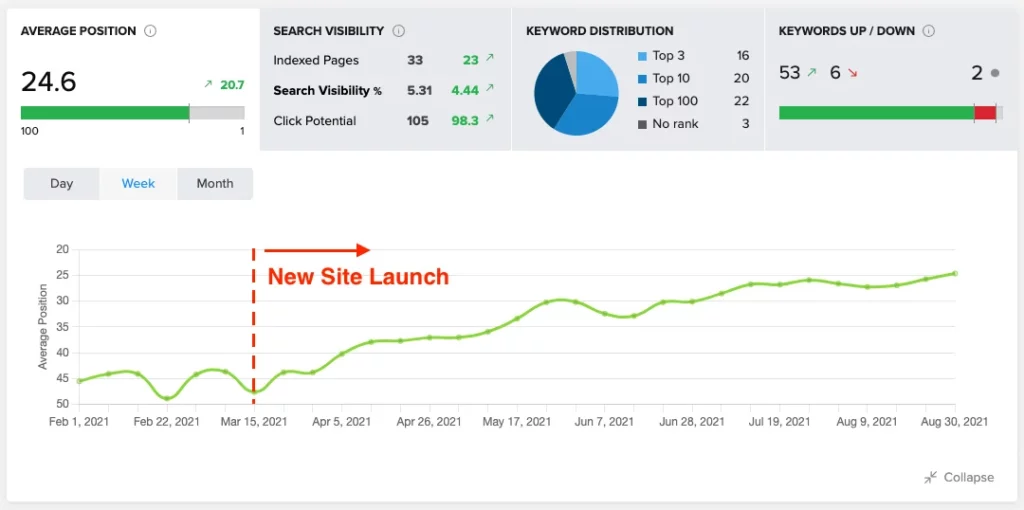Organic Growth Case Study: Boat Tour Operator 📜

We ranked a tour operator on the first page of Google for every major keyword in his category in 6 months.
This tripled (4x 💰) his business and reduced the amount of phone calls and manual “pre-selling” he has to do because most the sales are now automated through his website.
Read more about SEO for Tour Operators.


Here are 7 useful ways you can grow your own organic presence —
1. 🔎 Boring old keyword research 🔎
It all starts with keyword research. You absolutely need to pick the right keywords to go after and know what people are searching for to build out the content.
Your primary keyword should be the core of what you offer, usually something like “_____ trips in ______” (e.g. boat trips in key west OR key west boat trips). That’s what everything starts from, and then you build the strategy around that core keyword.
You need to match what you offer with the existing demand in the marketplace. People are most likely already searching for what you have – you simply need to place your brand in the flow of that demand.
We use ahrefs, but there are plenty of free/inexpensive tools out there.
2. 🥞 Flattened the information architecture 🥞
One of the biggest mistakes I see tour operators make with their websites is putting their tours on a dedicated “Tours” page. When you add a dedicated Tours page, you are burying ⚰️ some of your most important content, your tour information.
If you have less than 10 tours, keep them directly on the homepage. Most operators have less than 25 total pages on their site.
This makes it easier for both users to find your products to book, and signals to search engines what content is most relevant on your website.
Don’t bury your tours.
3. 📄 Loaded pages with relevant content 📄
Images are incredible at conveying what you offer to customers, but if you want to rank in search engines, you need highly relevant text content on every page.
The homepage needs to have plenty of text describing the tours that you offer, where you operate, and why people should book with you. Each page needs to have relevant content for its specific keyword.
Try not to have duplicate content on multiple pages, and try not to cannibalize the keyword you’re ranking for on one page with another page.
Shoot for at least 1000 words on the homepage that is relevant to your main keyword.
4. 📦 Productized private charters 📦
Many operators run private tours, perfect for the current germaphobe era. Unfortunately, this also means that itineraries and experiences are left to the customer’s imagination. That’s not good.
Customers usually have a specific idea in their minds regarding what they’d like to experience. And they are looking for you to be able to deliver that experience. If they can’t find it on your website, they’re going to move right past it.
Create example tours and itineraries and add them as products on your website. Show customers what they can actually expect and make it easier for them to make a decision.
We created 5 different private tours from a single “private charter” offering.
5. 🌻 Simplified the product offerings 🌻
I’ve been seeing operators offer 5 versions of the same product, each with its own product page, but with different start times / pickup locations.
I’ve seen operators use convoluted product names that don’t articulate what customers can expect.
This only confuses customers.
Simplify the product offering so that it’s super clear to customers what to expect. Don’t be afraid to offer products that your competitors are offering, but with your own spin.
If your competitor has “sunset tours” it’s probably because it sells. Have your own sunset tour with a twist. When potential customers come to your website, they’ll find familiarity in those products.
Keep it simple. Make your catalogue easy to understand to avoid “choice paralysis”, a common buying behavior when the customer feels overwhelmed or confused.
6. ☸️ Built a contextually-relevant hub of content ☸️
In order to give search engines a precise understanding of what your website is about, you can employ a content strategy called hub and spoke. This has proven to be the most effective information architecture for tour operators that we’ve seen.
Create relevant content around your core offering.
In our example, we wanted to rank for “Key West boat trips”. While doing our keyword research, we found relevant keywords that often show up alongside this keywords, like “snorkeling the Florida keys”, “boating in South Florida”, and “day trip to dry tortugas”.
Even though our client doesn’t offer these services, we know that Google rewards valuable, relevant content. So we wrote blog posts for these and other topics and linked out to the relevant providers.
7. Increased page speed🔥
Google is currently in the process of releasing a major update called Core Web Vitals, that will take full effect this month. It’s critically important to have a fast website on mobile and desktop if you want to rank well for your core keywords.
If you’re on WordPress, there are many plugins that can help increase the load times of your website and increase your performance. Check your website for free using Google’s Pagespeed Insights tool.
Anything less than a 50 is failing and will likely hurt your rankings. We just recently achieved 90+ scores for all of our clients.

